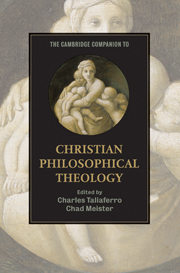4 - Omnipotence, omniscience, and omnipresence
from Part I - God
Published online by Cambridge University Press: 28 May 2010
Summary
Among the attributes Christians have traditionally ascribed to God are omnipotence, omniscience, and omnipresence. They not only appear to follow from God's maximal perfection but seem presupposed by his providential governance of creation. Christians have not always agreed on how these attributes are to be understood, however. / Omnipotence / Almost no theists think that God can perform logically impossible tasks. States of affairs such as the interior angles of a Euclidian plane triangle equaling 170 or 190 degrees are logically impossible, and hence no one can bring them about. Some think that necessary states of affairs like 2 + 3 equaling 5, while logically possible, aren't “producible” - that is, they can't have causes. If they can't, then no agent can produce them. Other states of affairs are logically possible and producible but can't be produced by God. For example, the state of affairs consisting in my freely choosing to spend the evening at home can't be brought about by someone other than myself since, if it were, then either the action wouldn't really be my action or it wouldn't be free. These aren't real limitations, though. Since the tasks in question (bringing about a logically impossible state of affairs, producing an unproducible state of affairs, bringing about another person's free action) can't be brought about by any possible being, no being could surpass God by possessing the ability to perform them. Hence, these tasks aren't included within the scope of maximally perfect possible power.
- Type
- Chapter
- Information
- Publisher: Cambridge University PressPrint publication year: 2009
- 3
- Cited by



